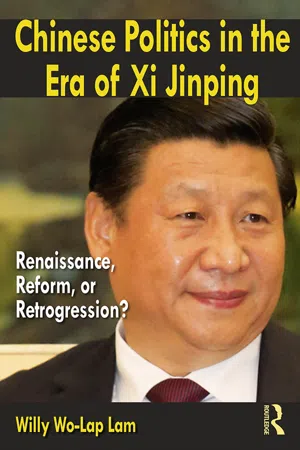Xi’s Problematic Emergence as Supreme Leader
Xi was officially selected as general secretary and CMC chairman at the first session of the Eighteenth Central Committee, which took place on November 15, 2012, a day after the conclusion of the Eighteenth Party Congress. During the week-long conclave, the 2,270 delegates representing the CCP’s 85 million members met for their quinquennial convention to pick the 205 full members of the ruling Central Committee, as well as 171 alternate, or nonvoting Central Committee members.10
At least in theory, Xi (b. 1953) should have been very happy with the results because of the political identities and traits of the six other members of the supreme Politburo Standing Committe (PBSC): Premier Li Keqiang (b. 1955), NPC chairman Zhang Dejiang (b. 1946); chairman of the top consultative organ, the Chinese People’s Political Consultative Conference (CPPCC), Yu Zhengsheng (b. 1945); executive secretary of the Central Committee Secretariat Liu Yunshan (b. 1947); secretary of the Central Commission for Disciplinary Inspection (CCDI) Wang Qishan (b. 1948); and Executive Vice-Premier Zhang Dejiang (b. 1946). Except for Premier Li, who is a senior representative of the CYL Faction led by ex-president Hu, all six PBSC members have ties to either ex-president Jiang Zemin’s Shanghai Faction or Xi’s Gang of Princelings.11
While the Eighteenth Party Congress was billed as one of the CCP’s most momentous events in the twenty-first century, it was also swathed in the patriarchal—and undemocratic—traditions of the ninety-one-year-old party. As with past practice, the composition of the new ruling organ—the seven PBSC members—was determined by the outgoing PBSC members as well as party elders, especially ex-president Jiang (b. 1926), who effectively ran China from 1989 to 2004.12 Three of the seven members of the new PBSC are deemed Jiang protégés. Apart from Xi, NPC chairman Zhang Dejiang and ideology and propaganda tsar Liu Yunshan owed their elevation to Jiang’s recommendation. Jiang and former Premier Li Peng (born in 1928) were instrumental in preventing two of Hu’s loyalists—Li Yuanchao (b. 1950) and Wang Yang (b. 1955)—from making it to the PBSC. Both Li and Wang, who have reformist reputations, have managed to hang on to their Politburo seats. Wang, who established a reformist reputation when he was Guangdong Party secretary from 2007 to 2012, became vice-premier in charge of foreign trade after the congress. Li, a former head of the CCP Organization Department, was given the consolation prize of vice-president—a post that does not have substantial powers.13
Xi’s apparent ability to get his way at the congress, however, was a function of several developments that illustrated the efficacy of the rule of man—not the rule of law or of institutions. First, there was a resurgence of geriatric politics. Jiang, who was instrumental in Xi’s promotion to the PBSC at the Seventeenth Party Congress in 2007 (see Chapter 2), again played the role of kingmaker in 2012. Jiang’s preeminent position was illustrated by protocol arrangements at the opening session of the Eighteenth Party Congress on November 8. The first to greet the delegates at the Great Hall of the People was outgoing general secretary Hu, who was closely followed by Jiang. A distance of several meters separated the two potentates from the other eight soon-to-retire PBSC members and Party elders including former PBSC member Song Ping (b. 1917).14
Moreover, the choice of the seven-member PBSC and the twenty-five-member full Politburo was also influenced by three political incidents, none of which were handled according to the spirit of “intra-Party democracy.” The first was the fall of the ambitious Chongqing Party secretary Bo Xilai (b. 1949). This became inevitable owing to revelations about the murder of British businessman Neil Heywood by his wife, Gu Kailai, in late 2011 and efforts by Wang Lijun, Bo’s police chief and right-hand man, to seek political asylum at the U.S. consulate in Chengdu in February 2012. Before his downfall, Bo, the charismatic son of Party elder Bo Yibo, had catapulted himself to center stage through his campaign of changhong dahe (singing [Maoist] red songs and combating criminal gangs). Bo also told intimates that he was a more qualified person to lead the country than fellow princeling Xi.15 In the wake of the Heywood and Wang scandals, Hu, Wen, and Xi pooled their resources to ensure the end of Bo’s career. Bo was relieved of all his Party positions in March 2012 and given a life sentence for corruption and abuse of power in September 2013. Gu received a suspended death sentence the same year. The entire handling of the Bo scandal, however, reeked of old-style skullduggery and back-stabbing. There was little “democratic” discussion of the Bo affair within the Party. And the punishment meted out to Bo and Gu was based on political, not judicial, considerations (see Chapter 3).16
For a brief period, the downfall of Bo the bad-apple princeling gave the CYL Faction some momentum. Given the widespread public perception that princeling-cadres had abused their special privileges—particularly in accumulating massive wealth and laundering their ill-gotten gains—Bo and Gu’s shenanigans brought disrepute to cadres with “revolutionary bloodlines.” Several princeling cadres and military officers suffered collateral damage due to their chummy ties with Bo. They included Generals Liu Yuan and Zhang Haiyang, who are the sons, respectively, of State President Liu Shaoqi and former general and Politburo member Zhang Zhen. Immediately after the announcement on March 15 that Bo’s Politburo membership had been suspended, there were wild stories of an aborted coup in Beijing. While these rumors turned out to be untrue, the Bo affair adversely affected the careers of Generals Liu and Zhang.17
Yet the so-called Ling Gu affair of March 2012 turned out to be even more of a disaster for the CYL Faction, particularly ex-president Hu. Ling Gu, the only son of Ling Jihua, who was then director of the CCP General Office and a close adviser to Hu, was killed in a traffic accident in Beijing. The twenty-three-year-old Ling was driving a Ferrari sports c...
